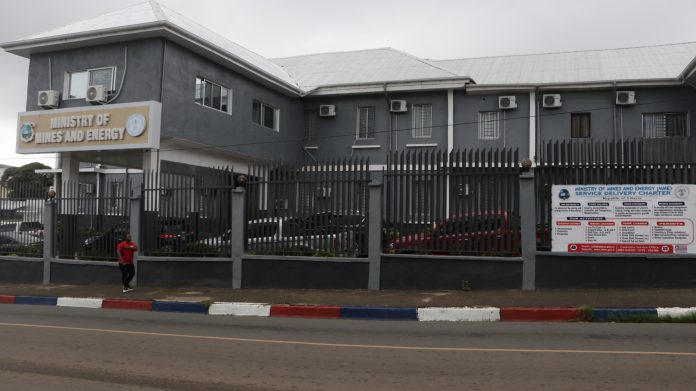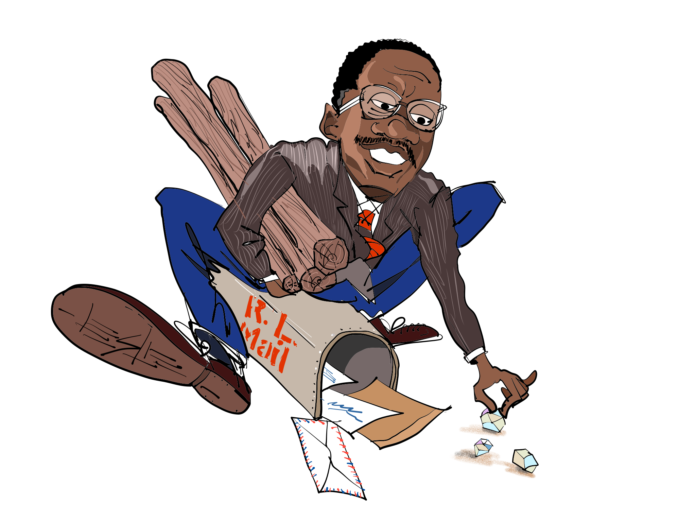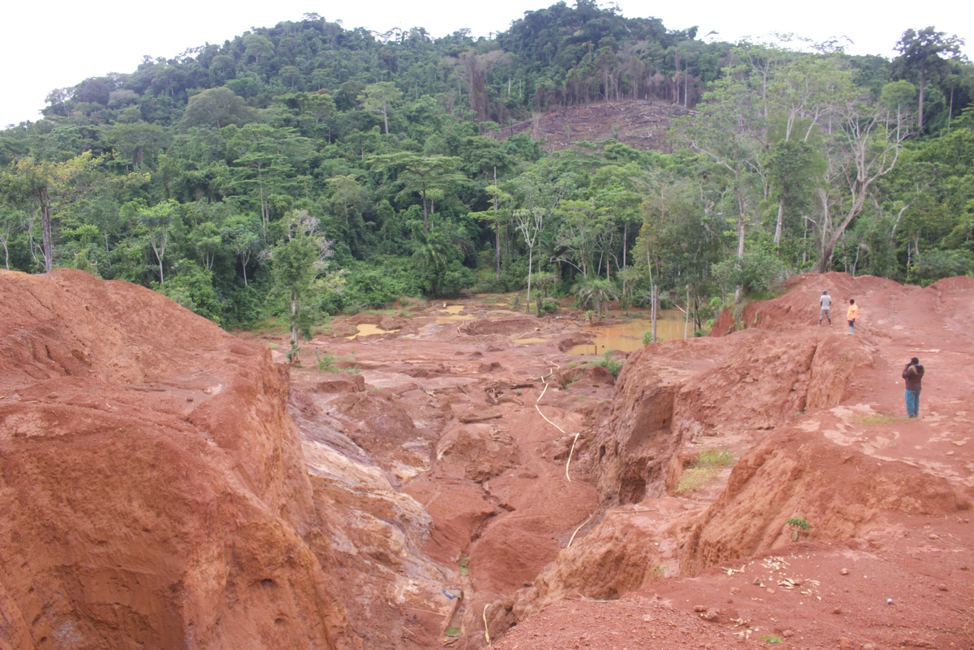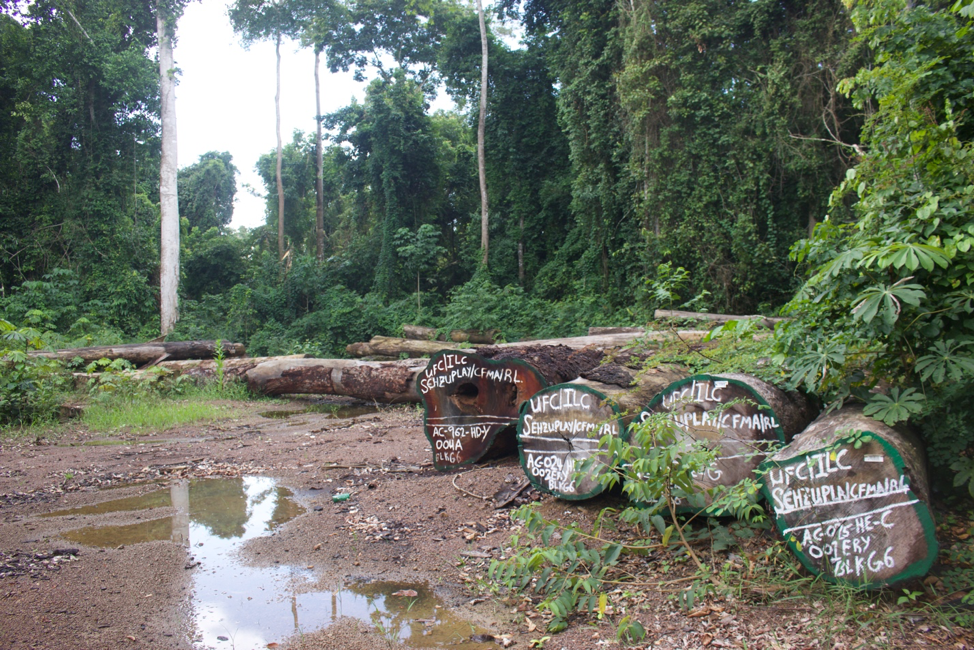Top: The newly renovated Ministry of Mines and Energy is part of an ongoing reform by Minister Wilmot Paye. The DayLight/Harry Browne
By Varney Kamara
MONROVIA – A bold, new signboard brandishes the phrase: “Ministry of Mines and Energy.” The walls glitter with freshly painted gray and white. Just beyond the lobby, a fenced yard holds items seized from miners. Inside, lighted corridors beam with hope and accountability.
These are part of a sectoral reform Minister Wilmot Paye is instituting for a bewildered yet promising mining sector. In an exclusive interview with The DayLight, Paye explains the reform, which ranges from employees’ productivity to combating illicit activities.
“That’s not where we want to be. We had to get the basics right. If we don’t get the basics right, how can we regulate two key sectors of our economy: the mining and energy sectors?” Paye tells The DayLight.
“Former South African Finance Minister Trevor Manuel said, ‘If you can’t measure it, you can certainly not manage it.’ So, first, we need to have the capacity. You have to have the personnel. You have to boost the morale. You have to have the equipment.”
Part of the internal restructuring, the ministry purchased office computers and equipment, according to Paye. Next, the administration stabilized electricity and restored order. Workers are now coming to work as early as 8 am and departing offices by 4 pm, in line with civil service rules.
Furthermore, the ministry has relocated the Liberian Geological Survey and Liberian Hydrological Survey on the Old Road to the ministry’s headquarters on Capitol Hill. The two offices collect and analyze rocks and water data to support mineral exploration.
Recent surveys suggest Liberia has vast mineral potential beyond its traditional mineral resources. However, the lack of scientific, evidence-based data has prevented the full realization of this endowment. Paye says the refurbished geological and hydrological surveys, with modern equipment, will help bridge that gap.

Recently, the ministry embraced new data from a Chinese-funded study that revealed over a dozen previously unidentified minerals, moving beyond iron ore, diamonds, and gold to seeking complete geological mapping of all ten quadrats nationwide, with only one section surveyed so far, he says.
Also, the ministry has abolished voluntary work, which has plagued the mining sector for decades. A 2021 General Auditing Agency (GAC) report found that 65 percent of the ministry’s workforce were volunteers. So, Paye dropped 225 volunteer inspectors, mining agents and patrolmen who did not complete high school, and retained 85 who did.
“When you have volunteer inspectors who were deployed across the country to help implement the mining laws and regulations, you are simply saying to them, ‘Go and pay yourselves, and that’s what happened,’” says Paye.
“What has happened over the years is that we had mining agents and people assigned to regulate the sector and implement the mineral mining laws—some of whom didn’t even finish high school. So, how can you monitor what you don’t understand?”
Eighty-five geologists and mining engineers have been incorporated into companies in line with the Minerals and Mining Law, and that number could rise to 114 in the coming months, according to Paye. The law requires firms to give preference to employing skilled Liberians in senior roles.
“The companies are legally obligated to provide what is called a “sustenance allowance” for two years. Some young professionals are earning about US$2,000. So, imagine a young person just leaving university and becoming part of the system. This is one way of grooming an industry, producing future industry leaders and decision-makers who can then be deployed and recruited across the country.”
That aside, the ministry has assigned 30 additional geologists and mining engineers to newly established County Mine Offices. Established in all 15 counties, these structures help to fight illicit mining activities. They, Paye says, are equipped with GPS devices and other tools whose lack hinders supervision.

Newly established county mine offices would oversee all mining and energy-related activities in their respective counties. Mining agents, the ministry’s highest local officers, will report to these offices, which in turn will report to the central office, Paye says. He adds the ministry has purchased GPS equipment and drones for fieldworkers to make their work easier.
Asked whether new county mine officers would not usurp existing mining agents’ function, Paye says, “No, there won’t be a clash. The county mine offices will oversee all mining and energy-related activities in their respective counties. The mining agents employed at the lower levels will report to the county supervisory offices.
“The only way to effectively curtail illicit mining activities is to have people on the ground with the technical knowledge to implement sustainable and environmentally friendly mining programs. We must consider the entire ecosystem of the mining sector: community welfare, the rights of license holders, and protecting investors, while preventing illicit operations. The real risk here is that we are losing a lot as a country due to illicit activities,” Paye says.
“What we are doing is establishing a serious presence across the country. Once we achieve that, we can hold people accountable, because there will be decentralized oversight,” Paye says. “We want to know what mining activities are taking place in River Gee County, for example—who is operating there, and who holds a license.”
‘Kata-kata’ machines
Illicit mining undermines Liberia’s mining sector, which contributes 15 percent to the country’s GDP. It is linked to pollution, deforestation, and annual losses of US$200 million, according to a 2021 report by the Global Financial Integrity, a US-based think tank dedicated to researching and combating corruption, illicit trade, and money laundering worldwide.


From the start of this year, the ministry and the Environmental Protection Agency (EPA) have shut down illegal and noncompliant mines countrywide. Coordinating with the Ministry of Justice and the Liberia Drug Enforcement Agency (LDEA), the crackdown has led to fines and prosecutions.
One of the areas of concentration is the use of devices in the artisanal mining subsector, locally known as “kata-kata” machines. Normally, the Ministry of Mines issues permits for kata-kata machines in difficult terrain. However, miners are using the machine so widely without the ministry’s approval. Illicit miners are also using dredges, which pollute rivers with mercury, destroy habitats, and pose a risk to public health.
In addition to those illegal activities, noncompliance is commonplace. There are government officials with shares in or control over companies, creating conflicts of interest. Some firms do not meet requirements, and there are issues with foreign staffers’ residency and work permits. Some companies have vague ownership structures, a breeding ground for terrorist financing, tax evasion and money laundering.
Paye calls on journalists and the public to join in the fight against illegal mining.
“We always tell our people to push their government to do the right thing,” Paye. Don’t side with companies. They’re not here because they love your country. They’re here because of what they see. Push your government to act right so the citizens benefit.”




